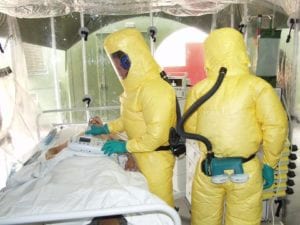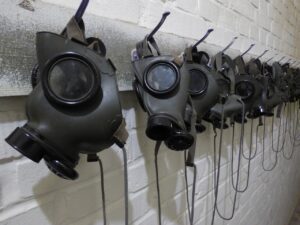Ebola
What is Ebola?
Ebola, also called Ebola Virus Disease (EVD), is a rare, deadly disease that affects humans and primates. It can be spread through contact with an infected human or non-human animal.
There have been a number of outbreaks of this disease since it was discovered, typically in Africa.
What are the symptoms of Ebola?
Symptoms can appear anywhere from two to 21 days after infection, but the onset is typically within eight to ten days.
The disease usually progresses from dry symptoms (fever, fatigue) to wet symptoms (diarrhea, vomiting). Symptoms include:
- Fever
- Aches and pains
- Weakness
- Fatigue
- Diarrhea
- Vomiting
- Stomach pain
- Unexplained hemorrhaging, bruising, and bleeding
- Red eyes
- Rashes on the skin
- Hiccups
This disease is deadly if people are not given the proper treatment.
What causes Ebola?
Ebola is caused by an infection from a group of viruses within the genus ebolavirus. Researchers are unsure where these viruses began, but they believe that it is animal-borne.
It is spread through contact with the blood, bodily fluid, or tissue of a human or animal that is infected. Sexual contact is another way through which this disease is spread.
How is Ebola diagnosed?
A diagnosis can be difficult, as this disease is rare and shares symptoms with many other conditions. In order to obtain a diagnosis of Ebola, there must be characteristic symptoms and possible exposure to the disease within the past 21 days. If both of these things are present, one should be quarantined immediately. A blood test, polymerase chain reaction, or other lab tests can confirm a diagnosis.
What are the treatments for Ebola?
Symptoms of this disease should be treated as they appear. Doctors should also ensure that patients receive enough fluids and electrolytes through an IV, oxygen therapy, medication for diarrhea, vomiting, blood pressure, fever, and pain, and treatment for any other infections that may occur.
There are investigational treatments that were shown to heighten the chance of survival during the 2018 outbreak in the Democratic Republic of the Congo: regeneron and mAb114.
There are also ways to prevent being infected by Ebola. People should avoid contact with any bodily fluids of those who are ill, items that have come into contact with people who are infected, funerals or any other rituals of those who died from Ebola, bats and primates, and unknown raw meat. There is also a vaccine available, rVSV-ZEBOV.
Where can I find out more about Ebola?
Ebola Articles


Nanobody Test Able to Identify Known (And Unknown!) Ebola Species

Ebola Can Persist and Re-Emerge Even Following Treatment, Study Shares

Six African Nations on Alert Following Ebola Outbreak in Guinea


The End of an Ebola Outbreak Brings New Problems to Survivors

Regeneron’s REGN-EB3 Proves Superior as Treatment for Ebola in Clinical Trial
-300x300.jpg)






